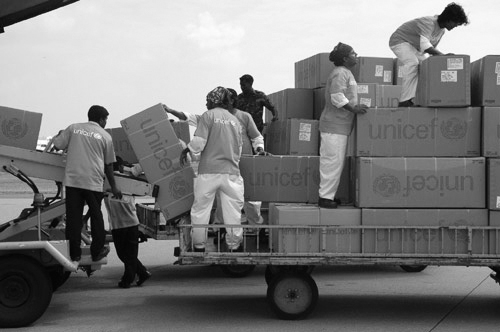
By Seo Yeon-ji
In the heart of the Pakistani earthquake area, hundreds of aid workers, including both specialists like satellite image interpreters and nutritionists and first-time volunteers, stay in tents around the clock supplying food and shelter for the victims. Staying up all night planning for tomorrow’s aid and departing the next morning to help those in outlying areas who have not been reached is just part of the job. International civil servants are more determined than anyone else to commit themselves to bettering the lives of others in this world. These people come from around the world, and the call has been heard in
According to a survey by the Monthly Joongang, 243 Koreans are currently working as international civil servants in 41 organizations, and interest is growing.
What then are the ways to become an international civil servant? To become a junior level professional worker in the international civil service field, there are five main ways: the Junior Professional Officer (JPO) program, the National Competitive Recruitment Examination (NCRE), the Young Professional Program, Internships and governmental recommendations.
The JPO program is run by countries that do not have enough UN workers to meet their financial commitment to the organization. In
Kim Hee-jin (Law, ’05), who is preparing for JPO along with her study at the KDI School of Policy & Management said, “Participating in activities like volunteering and working in international conferences where you can improve your international awareness will help in taking the exams.” Although, JPOs are not regular workers of the UN, the program provides a stepping-stone that increases the possibility of being hired in the UN as a regular worker afterward.
The next way of becoming an international civil servant is through the NCRE, which is an exam to recruit nationals of selected member states at the junior professional level for employment at UN offices. This examination is open to men and women who are nationals of the member states participating in the NCRE. Qualified women are particularly encouraged to apply due to the small number of women workers in the offices. Applicants should hold at least a first-level university degree related to the area in which they would like to take the examination. Applicants should not be more than 32 years old and fluency in either English or French is required.
People can also enter the international civil service field through the Young Professional Program offered by 18 international organizations including the World Bank and, the United Nations International Children's Emergency Fund. This program is designed to recruit workers to meet the specific demand in these organizations. “Job vacancies for this program are easily found on their websites so it is a highly recommended method for those who seek employment in international organizations,” said the Environmental Affairs Officer at the UN,
Furthermore, some people get employed after their internships in international organizations or through recommendations by MOFAT when the UN announces job vacancies. Kim Kyoung-soo, who worked with the UN Military Observer Group in
Kim is also the founder of an Internet Café “The UN and International Organization” that provides useful information and a place to share work experiences at international organizations for those who are preparing to be international civil servants. Kim Hee-jin, who also interns at the UN Office of Legal Affairs, said, “It is very important to keep up good relationships and form a human network with people you have worked with, as many people get recommended or even selected by their supervisors after they intern.”
After an initial posting or two, most international civil servants require more practical work experience in their field to advance to higher-level jobs. There are no standard paths to advancement but various methods that differ from person to person.
Professor Choi Byoung-il (International Studies) said, “Many Koreans have the possibility to work in international organizations, as
Kim Kyoung-soo said that as there is a shortage of Korean workers in international organizations and, as Ban has become the new UN Secretary-general, Koreans’ role will be bigger than before in the international community. As many organizations have gender equality schemes where they hire more women workers, women are especially encouraged to apply.

